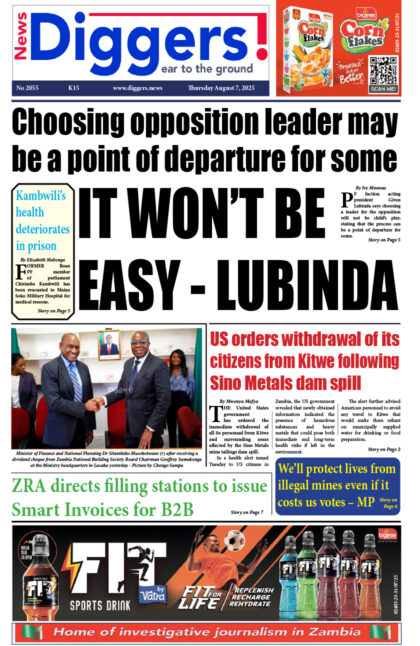When your husband dies and your gorgeous single neighbour comes in weeping more uncontrollably than you, it is time you stop crying and start asking some questions. You might want to find out why someone who is not a relative is more devastated by the loss of your husband than you the family members who are trying to stay strong. If you ask the right questions, you may discover that she had private interests in the deceased.
We the journalists in Zambia are mourning the loss of our nobility as media practitioners. Our integrity has been murdered by bad elements that have infiltrated the Fourth Estate. We have lost our cherished esteem and we are trying hard to stay the course as we fight the forces that have ganged up to obliterate our profession.
But during this episode of mourning, we have discovered that our beautiful single neighbour is five times more miserable with our predicament than we are ourselves. This neighbour is weeping more uncontrollably than us who are directly affected by the problem.
We have to stop crying and start asking questions. Why is it that the Minister of Information Dora Siliya and her Permanent Secretary Mr Chanda Kasolo are crying more uncontrollably than the affected media houses and the general public? Why are they offering to pay for the entire funeral cost and even forcibly take over the custody of the surviving children?
We appreciate the support, but this is not exactly your funeral, Honourable Siliya and Mr Kasolo. It is a funeral for the public and the media. Please, with all due respect, sit down. Your discomfort over our discomfort is killing us. Kindly take a chill pill and hear how we, as family members, would like to proceed in resolving this issue.
You can’t use the excuse that you are trying to protect us as if we have declared that we have failed to protect ourselves. You can’t claim that you are trying to protect the public because there is no single case of defamation or libel that you can point at which has not been prosecuted using existing laws because of lack of media regulation laws.
Yes, we are concerned and we are not happy that our profession is under siege. That is why the Media Institute of Southern Africa (MISA), the Zambia Institute of Independent Media Alliance (ZIIMA), the Media Liaison Committee and other assigned organisations are already working round the clock to organize an Indaba where all media houses in Zambia will come together to identify means of protecting the profession and raising the benchmark for ethical news reporting. We want to form a body of association that will provide oversight on how we self-regulate our activities. As we mourn, we are working.
But these neighbours residing at the Ministry of Information have hijacked our funeral! They are pushing us into foster care against our wish. This is not showing love to the grieving family, it is taking advantage of the situation to advance a selfish private agenda.
One doesn’t need to be a journalist to sense danger in the remarks that have consistently been made by the Permanent Secretary, that they are taking over the regulation process because we have failed to regulate ourselves. His statements speak volumes about the vested interests that the government has in this issue than providing solutions to the problem.
We can bet with the Permanent Secretary, the Minister, or indeed anyone else who is supporting this statutory media regulation agenda that if they think it is the best solution to curbing social media and press freedom abuse, they have already failed lamentably! Even a grade 9 dropout can tell you that you can’t bring sanity to social media by regulating mainstream media.
This media regulation law that they desperately want to legislate is not targeted at the abusers of press freedom on social media or in mainstream media, it is targeted at critical journalists who have been exposing bad governance. They want to have control over who can become a journalist in Zambia. They want to establish a privilege for them to give practicing licences to news reporters, which they can withdraw at will if that particular journalist is not serving their interests.
This is what we are rejecting. Yes, social media has brought with it a lot of inconveniencing experiences to the public, the mainstream media and, indeed, the government itself. But while we find means to solve the problem, we must bear in mind the fact that we are now living in the digital age. Technology has given everyone the power to publish what they wish, and it would take a century to reverse that. We have no option but to adapt or die!
























